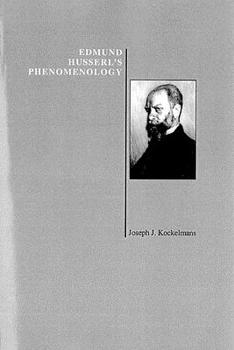Edmund Husserl's Phenomenology
Edmund Husserl (1859-1938) has secured a place in the history of Western thought as one of the most influential philosophers of the twentieth century. As the principal architect of phenomenology, he inaugurated a method and conceptual framework that advances inquiries in the fields of logic, epistemology, ontology, ethics, and the philosophy of history. In Edmund Husserl's Phenomenology, Joseph J. Kockelmans provides the reader with a biographical sketch and an overview of the salient features of Husserl's thought. Kockelmans focuses on the essay for the Encyclopedia Britannica of 1928, Husserl's most important effort to articulate the aims of phenomenology for a more general audience. Included are Husserl's text - in the original German and in English translation on facing pages - a synopsis, and an extensive commentary that relates Husserl's work as a whole to the essay for the Encyclopedia. Edmund Husserl's Phenomenology is recommended for graduate courses in philosophy and psychology and for scholars of other disciplines interested in the roots of phenomenology and contemporary continental philosophy.
Format:Paperback
Language:English
ISBN:1557530505
ISBN13:9781557530509
Release Date:August 1994
Publisher:Purdue University Press
Length:380 Pages
Weight:1.40 lbs.
Dimensions:1.0" x 6.1" x 9.2"
Customer Reviews
2 ratings
Superb book by a consummate expert on Husserl
Published by Thriftbooks.com User , 18 years ago
This book is an outstanding presentation of Husserl's philosophy. The book draws upon important texts that are not readily available to English-speaking readers (e.g., the Husserls' lectures in Amsterdam and Paris), and it provides a careful analysis of how Husserl's ideas evolved over time. It provides a lucid account of the relation between phenomenological psychology and transcendental phenomenology. Chapter Seven ("The Transcendental Problem: Its Origin and Its Quasi-Solution by Psychologism") describes the origins of the concept of the transcendental and presents an account of how that concept evolved in the thought of Kant and Husserl. That chapter also discusses the evolution of Descarte's concept of the cogito. Dr. Kockelmans' understanding of Husserl's thought and of Husserl's importance to the history of philosophy is impeccable. He is currently Distinguished Professor Emeritus at Penn State. I had the good fortune of attending quite a few of his classes and seminars in the 1970s. He is a man of deep and abiding compassion. He was a superb teacher who invariably presented his subject with elegance, grace, critical exactitude, transparent clarity, and sublime intellectual humility. This book is a fine book, and I highly recommended it to anyone with an interest Husserl, phenomenology, and transcendental idealism.
kockelmans' approach clairvoyant, rigorous but "smooth"
Published by Thriftbooks.com User , 27 years ago
Prof. Kockelmans navigates the reader (even the uninitiated, as was I) through the prinicpal features of Husserl's thought. His writing is extremely well-structured, such that the reader's comprehension proceeds in equal rhythm with the author's careful explanations. After studying some medieval philosophy with Prof. Kockelmans I can confidently say that his understanding of the history of thought, art, and science are inspiring; all of this adds to the finish of the book. His style is never cumbersome--though he retains all of the slippery terminology of the discipline--and his summary is without superfluity. This is a highly important and recommendable work. Jason Stell





